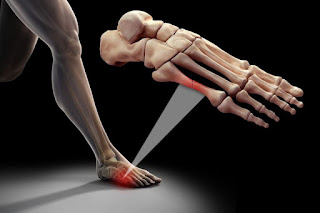The Warrior And His War. Kevin Durant: Calf Injury, When Will He Be Back?
To understand the current calf injury that Mr. Kevin Durant
suffered few days ago, we should start reviewing his injury history. In 2015 he
had surgery 3 times thanks to an initial Jones fracture. What is that? Simply
put a fracture of the 5th metatarsal, in his case it was most
probably due to an overload of the area caused by inadequate mechanics.
The pictures below show that since early on in
his career, there has been a pattern of movement that precisely loads the damaged
foot’s region.
To simply understand how this happens, imagine that his foot
is prepared to deal with his 240 pounds every time that he lands, changes
direction, pushes off, etc. If the load is distributed across a smaller or inadequate
anatomical area than the particular technique requires the structure can give
up and get injured.
Why? Because when a bone area is loaded beyond
its capacity, it can decrease the quality of the bone and as a consequence the
“material resistance” as well (meaning how well the bone material is organized,
how “good” is the material’s quality and how much material is available to
effectively do its job). Over time, the probability of the structure breaking
increases. (See pics. bellow).
This picture shows different stages of density and
organization of the material. When there is overload in a bone the material
quantity, the material quality and/or the material distribution can change,
decreasing the resistance of the bone while increasing the risk of fractures.
Now you might ask how this is related to the calf injury
today. It is true that we never have the full disclosure of each injury’s real
history, or the complete medical diagnosis. However, we can play detective, and
produce the most probable explanation considering the available data.
If the mechanics are the most feasible cause of the foot
fracture in 2015, it is likely that other tissues have been affected as well.
After the foot injury’s recovery, we can see (watch the
pictures above again!) that he never changed the mechanics of his movements, which in
all likelihood caused the injury in the first place. Therefore, one factor that
might be contributing to his current calf problem is the uneven load applied to
his leg.
full/healthy athlete’s recovery. The accumulation of lactic
acid in such intense games, together with physiological limitations to remove quickly
lactic acid creates a propitious biochemical environment for muscle damage (considering
that most of the conditional training is high intensity! Just watch the videos on
YouTube and you will see running hills, weights, sprints, etc. Those are all
activities that don’t develop the system for removal of lactic acid).
So, as an athlete of mine asked me, can we know when he will
be back? And, will he be safe?
First, an injury of this type requires:
1)
Full recovery of the structure (muscle) that is
only possible after several months of rest and rehabilitation;
2)
Change in mechanics to avoid overload of the
already damaged structure;
3)
Increment in physiological capacity to efficiently
remove lactic acid.
Since the previous is not going to happen because there is no
time (and if they have not implemented this process yet, why would it happen now?), my
educated guess is that he will be numbing the area in some way or playing with
pain.
Will he be safe? No! Without perception of pain he will load
the area more than the structure can resist and eventually damage the muscle
further...maybe Mr. Durant will get lucky and just get the “ring” before this happens!
















Comments
Post a Comment